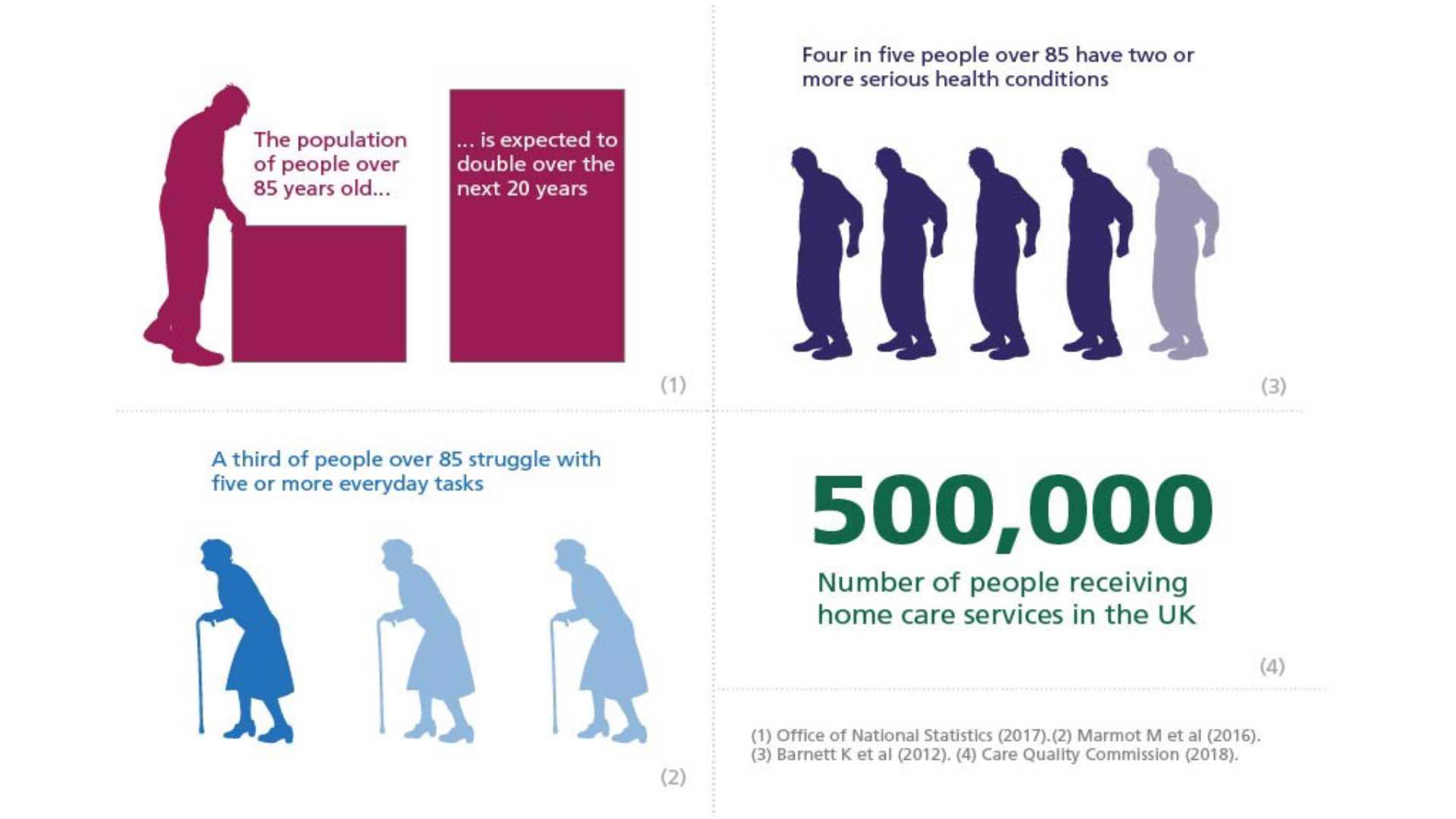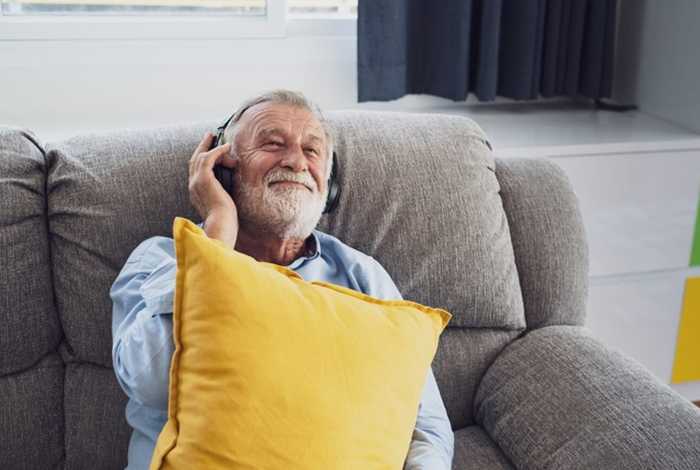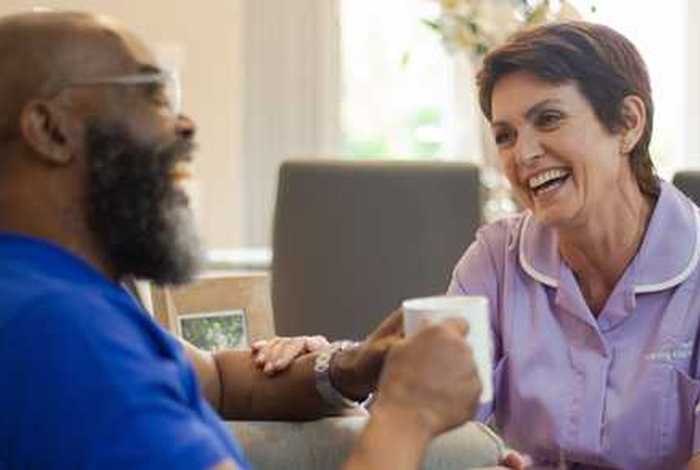Posted by Rachel Bashford
Can tech assist seniors with frailty?
Technology is becoming more integrated within frailty support.
What tech is available and is it effective?
This article will cover the latest on:
- Frailty and the issues presented when older people experience it.
- What tech is available to assist older people in their own homes and in care facilities?
- The future: tech developments that could improve life for frail seniors.
What Is Frailty And How Does It Impact Seniors?
Frailty is a recognised health status where the body’s systems are weakened or influenced by the ageing process. It has been reported that around 10% of over-65s are known to exhibit frailty, increasing to between 25-50% of those age 85 and over.
The British Geriatrics Society acknowledges two frailty standards: the Phenotype model and the Cumulative Deficit model.
The Phenotype model measures 5 physical characteristics and defines frailty as being present if 3 are exhibited. The 5 characteristics are: unintentional weight loss, weakened gait and muscle strength, reduction in energy levels and evident fatigue.
The Cumulative Deficit model includes a clinical frailty scale with a frailty index to measure a range of physical attributes, such as loss of hearing, signs of tremors or low energy to define if an individual should be diagnosed with frailty.
Frailty is a growing issue in our older population. In the UK, there are an increasing amount of people living with complex needs and conditions, particularly as they age.
According to the National Institute for Health Research, the issue of frailty is going to create a significant pressure on health services due to deteriorating health in seniors.

As a result, technology is becoming a vital component in the daily support of older people with frailty. From monitoring devices to voice-activated technologies, these facilities are enabling older people to age in place for longer and to avoid unnecessary visits to hospital.
In this video from Age UK, older people and their families discuss the impact frailty conditions have on their lives and their levels of activity.
In truth, the impact of frailty conditions on the over-65s is becoming more and more of a concern to charities, health services, families and individuals affected. A long stay in hospital after a fall, or confusion and fatigue due to weaker muscle and skeletal functions are all evidence of how debilitating frailty can be for those living with the experience.
The question on everyone’s minds is: how can we improve the quality of life for those living with frailty? This leads people to consider the practical impact of technology as part of the strategies employed to support frail older people.
How Can Tech Assist Frail Seniors?
Over recent years, a whole host of assistive tech has been made available as a proactive approach to the frailty experience. However, it’s clear there is a real challenge to get the right technology for the right condition to the person affected.
As technology evolves, the variety in relevant equipment choice is presenting both a bonus to those with frailty and an obstacle – learning how to use technology to support you when you have frailty can be a struggle. Research has suggested that as much as 40% of assistive technology is never used in the home (Federici 2016).
Nevertheless, if older people have the proper support in place to help them in the comfortable daily use of these pieces, then it’s likely this equipment will improve quality of life for frail seniors.
What Types Of Assistive Tech Are Available?
According to the European Parliamentary Technology Assessment 2019 report, there are three main areas of technology that can potentially help support older people:
- E-health or digital technologies for remote care. These could be examples of remote blood pressure or glucose monitoring and video conferencing appointments between healthcare professionals and individuals with their families.
- Assistive technologies (AT) can be very productive in supporting people with frailty to stay in their own homes for longer. Equipment such as voice-command technologies, wheelchairs and stair-climbing seats can all help seniors to move around their home safely and with relative freedom so that they can enjoy an independent lifestyle for longer within a secure environment.
- Robotic technology is evolving and can already be found as part of some care packages for those with frailty. Emerging evidence suggests that the use of robotic wheelchairs and shower chairs are providing effective support when it comes to situations involving frailty.
It’s becoming much more common for remote digital technologies to be involved in senior care. Motion detectors to assess the movements of wearers to ensure they are stable and able to move enough during the day, along with pendant alarms linked to emergency response centres are just two pieces of tech that are being integrated into care packages.
In addition, fall sensors to keep track of any potentially dangerous trips that occur and vital signs systems to collect data for those with long-term or serious health conditions are also evident in care these days.
Meanwhile, wearable health monitoring devices, such as those seen on the wrists of athletes or people interested in fitness, are being brought into play for seniors living with frailty. These devices can track steps, heart and activity rates to monitor the wearer’s general health state to try and ensure a stable daily routine and to maintain good health over time.
Integrated and joined-up technology is taking a more prominent position in older people’s homes. These monitoring and response systems can help support a wider variety of over-65s with different needs and conditions, particularly those suffering from dementia.
A recent NIHR study conducted with seniors displaying mild to moderate dementia addressed the problem of waking at night and feeling disorientated. The researchers developed software systems, bed sensors and cues to turn on technology controlling lights, music or TV which could provide reassurance or alerts for response services.
Will Tech Shape The Future In Frailty Care?
Sheffield Hallam University has joined a research conglomerate, looking into the use of robotic technologies as part of support for those with frailty. The research will look at how robots can assist frail people in daily physical tasks, as well as support complex health conditions.
Alessandro Di Nuovo, professor of machine intelligence at Sheffield Hallam University, who is leading the project said: “We will nurture co-designed research to help lead to novel technologies capable of transforming how frailty is managed in the community. Up to 10 funded feasibility pilot studies will drive co-designed, high-quality research that will lead to technologies capable of transforming community health and care.”
The university joined the network in 2021, so reporting may not begin for a few years, with many healthcare companies and invested parties eagerly awaiting the outcomes on robotic support for frailty conditions.
Another university investing in research that supports older people is the University of Manchester. One of their research teams has been involved in the development of an ‘evidence-based’ app called ‘Keep-On-Keep-Up’ or KOKU.
KOKU has the primary purpose of helping older adults take control of their health and reduce the risk of falls. It’s true to say other apps have been trialled before that try to deal with fall reduction and fitness goals.
However, KOKU has been evidenced as far more effective due to its personalised approach. Around a third of people over 65 and 50% of the over-80s suffer at least one fall a year.
Studies have proven that strength and balance exercises can reduce falls by over 40%. The big challenge is getting people to complete the exercises regularly over the long-term to improve their health and resilience.
KOKU delivers personalised exercises with an animated in-app trainer called Wilf. It also uses health literacy games to increase awareness of home safety, the importance of hydration and good nutrition.
Principal Investigator Dr Emma Stanmore from The Healthy Ageing Research Group at The University of Manchester explained that: “KOKU is particularly relevant for older adults concerned about their risk of physical decline and wanting to remain independent at home. But it’s also helpful for care home staff looking for interactive ways to engage older residents with simple activities or people concerned about ageing relatives at risk of falls or frailty.”
In further robotics news, a pioneering research project developed through Trinity College, Dublin is showcased in the video below. Stevie is a socially assistive robot, designed to help users by engaging with them socially as well as physically.
What’s interesting is the robot is equipped with autonomous navigation and can be useful in care settings in a number of ways. Stevie’s face can double as a video-conferencing screen, enabling a resident to video chat with staff, family or doctors.
It’s possible that a later version of Stevie could take meal orders on a touchscreen body attachment, going from room to room in a care home or secure housing.
Other functions being augmented are quite significant. Stevie can recognize voice commands such as “help me,” and, when integrated into a care setting’s IT system, the bot could alert staff to a resident if they needed support.
At this point, Stevie is a working prototype bot, with Trinity College researchers still continuing to perfect functionality for wider, more established care setting usability.
What is the best way to find information on elder care providers in the UK?
Older people and their families are increasingly using Autumna to search for reliable advice about how to secure the best possible future retirement home, home care, live-in care service or care home.
By completing this short form you can let our advice line team know exactly what type of care is important to you. They will then filter our database of over 26,000 care providers and send you a free shortlist of those who can help.
Alternatively email us here: info@autumna.co.uk or call our Advice Line on 01892 335 330. Our phone line is open seven days a week. (8:30am - 5:30pm Mon-Fri, 10am - 5pm Sat, 10am - 4pm Sun).
Other articles to read
Autumna Blog

Older Persons Care Advice
The Effects of Music Therapy on People Living with Dementia
March 12th, 2024
How can music help people with dementia feel calmer, happier and more connected to people? Find dementia-friendly playlists here.

Older Persons Care Advice
Day Care – A first step, respite, or to have fun!
March 12th, 2024
A chance to socialise means the world to some older people. Day Care services for respite provide an opportunity to laugh, learn and listen to like-minded people. Here's how.

Older Persons Care Advice
How Much do Pensioners Need a Year to Retire?
February 8th, 2024
Women's retirement savings are on average £69,000 while men's savings equate to £205,000. Autumna looks at why women’s retirement funds are less than men's in the UK and how that affects their choice of care.






